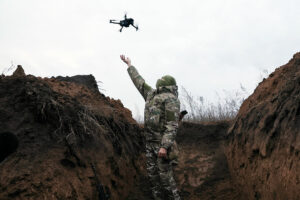Drone strikes show Putin his homeland isn’t safe

REPORTS of significant attacks against two Russian air bases are a new and dangerous twist in the Ukraine war. One of the explosions was at the Engels-1 air base in the Saratov region, the other at Dyagilevo in the Ryazan area — both hundreds of miles inside the Russia-Ukraine border. Several Russians were reportedly killed or wounded, and at least two aircraft damaged. Moscow immediately blamed Ukraine for the strikes, which appear to have been conducted using unmanned aerial vehicles.
While the Kyiv government hasn’t openly taken credit, it hasn’t denied culpability. One adviser to President Volodymyr Zelenskiy tweeted: “If something is launched into other countries’ airspace, sooner or later unknown flying objects will return to departure point.” Hardly cryptic.
The strikes occurred against an important tactical backdrop: an escalating Russian bombing campaign against Ukraine’s critical infrastructure. As his ground game continues to falter, Russian President Vladimir Putin has taken to the air to punish the civilian population. It is the latest in a series of Russian war crimes, coming just as winter descends and electricity and heat become matters of life and death.
Assuming Ukraine launched the drone strikes against what are legitimate military targets, albeit over 300 miles into Russia, what are the implications for the overall conflict? Should we worry about serious escalation?
Having watched the Ukrainians suffer for months from murders, rapes, indiscriminate bombing of civilian residences, and attacks on electricity, water, and nuclear power plants, it is increasingly hard to counsel them to simply sit back and take what Putin wants to dish out.
The Ukrainians are mad as hell and not going to take it anymore — not while they have the ability to reach out and touch Russian military targets.
Leaders in Kyiv are going to try to maintain a minimal level of deniability about strikes within Russian territory, but there’s little doubt they will conduct them. From their perspective, there is little to lose. Russia is already on a full war footing, and short of using nuclear weapons (a line even Putin would hesitate to cross) the Kremlin really doesn’t have additional combat cards to play.
These strikes may have been calibrated to serve simply as a demonstration of Ukrainian capability. Going ahead, Kyiv can go bigger, but will be careful to strike only purely military targets, maintaining the high ground over Russia in terms of international law. Unless Putin stands down from the air war (highly unlikely) his homeland will be under attack.
Western backers will try to restrain the Ukrainians from launching larger-scale attacks, hoping to reduce the risk of the conflict spiraling further and drawing in the North Atlantic Treaty Organization (NATO) directly. NATO will try to mollify the Ukrainians by offering more and better surface-to-air missiles to defend their cities, and may seriously consider supplying combat aircraft.
If the Ukrainians are given tools to truly “close the skies” over their nation, they might be more amenable to refraining from long-range attacks. But as things stand, Ukraine has every right to respond against targets inside Russia. Doing so with unmanned vehicles is a prudent path. Unless the West is willing to protect Ukrainians from a terror campaign from the sky, we should get out of their way.
On the other side, these attacks will likely harden the Russian military’s resolve and provide Putin with the talking points he wants for the Russian population: Ukraine is attacking us! But more than nine months into his brutal war, his approval rating at home is suffering and his international support dwindling. Sanctions are biting the economy, and price caps on Russian oil went into effect on Monday. Europe is holding together well in the face of Russian energy blackmail.
Much like the famous air raid on Tokyo by US Colonel Jimmy Dolittle in the early days of World War II, the drone attacks show a weakness in a supposedly invulnerable home front. It may help ordinary Russians to see the mounting costs of what might best be termed “the war of Putin’s ego.”
BLOOMBERG OPINION




